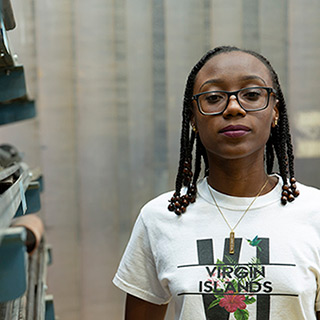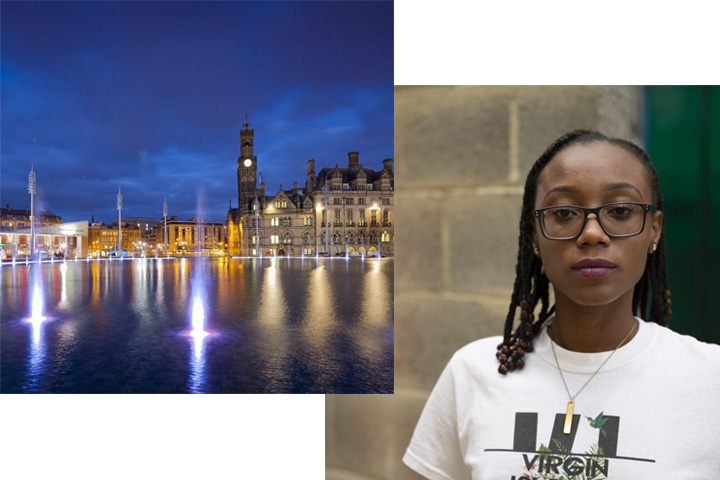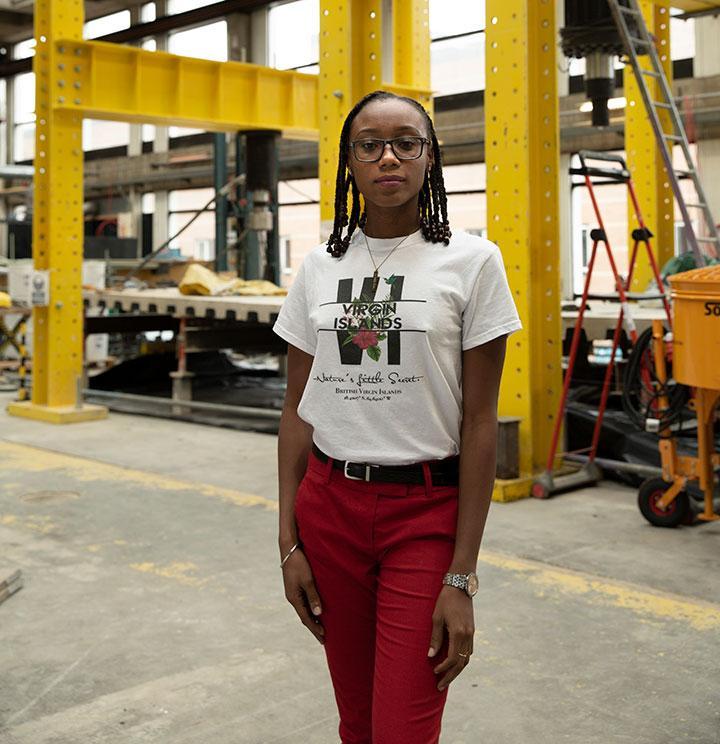
Erika
BEng Civil and Structural Engineering with placement year
First-hand experience
"Growing up in the British Virgin Islands, I always wanted to get into construction. The British Virgin Islands has lots of storms but they don't have adequate infrastructure to deal with catastrophes. They need young fresh minds.
"After college, I had various jobs including firefighting and modelling. At an event, I saw someone wearing a Civil and Structural Engineering Limited t-shirt so I followed him around until I got to talk to him and tell him I wanted to study engineering. For the next six months, I emailed him every week until he replied, telling me to come to his office straight away for an interview.
"He must have liked me because he gave me a job and I got my first experience of working in engineering, working on projects for Richard Branson on Necker and Mosquito Island. So I got the experience, next I needed to learn the theory.
“As a resident of the British Virgin Islands, an overseas British territory, I can go to university and work in Britain so I looked at universities there. I applied through UCAS and watched YouTube videos of students talking about how they felt at university and I chose Bradford – or maybe it chose me!"
-720x480.jpg)
Making my move
“Just before I set off for the UK, I went to Mexico to get my eyes checked and while I was there, the Category 5 Hurricane Irma hit the British Virgin Islands. I was safe but I couldn’t contact anyone from home for days. When I did, my mum told me everything was gone: houses, telephone poles, everything.
"She told me to go straight to England from Mexico. When I asked her about the stuff I’d bought to take to university, she told me there was nothing left so I rescheduled my travel plans and flew straight to university with nothing.
“When I arrived I was picked up by a student ambassador at the airport. The Disability Support team at the library gave me toiletries and the people in my accommodation gave me clothes until I had chance to pick some stuff up. The girl who came to pick me up from the airport really helped me through the transition and she has become my best friend here.
“When I stepped out of the plane I said: “Is there air conditioning outside here?” because it was so cold! It was September and it was about 14/15°C! I was staying in Arkwright House and the other students all seemed to be from cold places like Russia and Romania! For the first couple of months I had to have the heating on 24/7. I’m not built for the cold!"
Life in Bradford
“During my Foundation Year, I was part of the African Caribbean Society and it was a great way of meeting people – it was a relief to find people similar to me.
“This year I’ve been living on my own in private accommodation and it’s lovely – if I put my cereal down, I can expect to see it there the next time I want it.
“In some ways Bradford isn’t too different to my home in Tortola. It’s small and quiet and you can get from A to B easily. Leeds is close if you’re looking for an adventure. The biggest difference is that there’s no beach nearby! I’m used to going to the beach every day."

I appreciate the support you get, in particular Maths Clinic, which I call my second home. They have support sheets on all the different topics and you can take in your class notes and they'll explain it in a simpler way to make it easier to understand. I really love it, it's very supportive. They make you feel that no question is a dumb question.
Future aspirations
“I hope that after my degree I get opportunities to work all around the world. I would like to get experience of construction in different countries and see how the infrastructure works there. I’m interested in what I could take from construction in Saudi Arabia and apply it to a project in England. I would like to find better solutions for the problems we have in the world today.
“If any international students are thinking about applying to Bradford I would tell you to come. There are lots of people to help you, clubs to join, kind friends you can trust and plenty to do. The library is open 24 hours a day and everything is easy to access. There’s lots of support with the library, with maths and with life. If you’re completely new to university life, that makes it a great place to start.
“I call Maths Clinic [part of the Academic Skills Service] my second home. I go there almost every week and Helen, who is part of the team there, knows me so well that as soon as I walk in she puts the heating on because she knows I’ll be freezing!"
I can already see how the things put in place in the Foundation Year will help with my second year - and with life.
A strong foundation
“I chose to do a Foundation Year to get up to speed on the sciences I hadn’t studied. I was so thankful for it because I had been out of learning for four or five years, so it was a major help.
“It helped me improve my time management so I can be better prepared. Time goes so quickly – I look at a semester and think ‘I have 13 weeks’, then all of a sudden it’s ‘where did that 13 weeks go?’
“The course at Bradford is perfect for me because I wanted to focus on both Civil and Structural Engineering. The first year of my degree was really interesting. Some of the subjects were building on what had been covered in the Foundation Year but the new ones like Thermodynamics and Thermofluids were more of a challenge. And the Maths went from ‘wow’ to ‘wowsers’!
“I think the placement year will be the third year of my degree so I haven’t put too much thought into it yet but I might go back to the British Virgin Islands and do it at the company I used to work for. Doing a placement year gives you an advantage because employers are looking for experience and they’ll value the skills you’ve acquired. They want someone with experience of the industry and of working in a team.
“The best thing about studying here is the smaller class size which means you get plenty of attention, your questions get answered, it’s not too noisy and you can sit wherever you like. It’s more interactive and you work in small groups on assignments so you get to know everyone."

